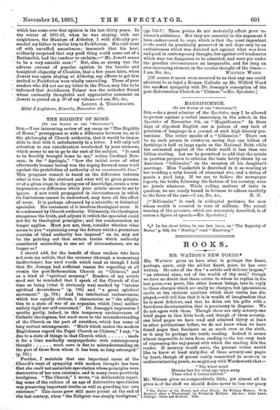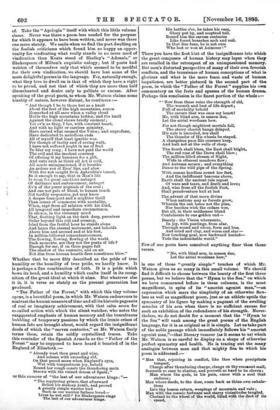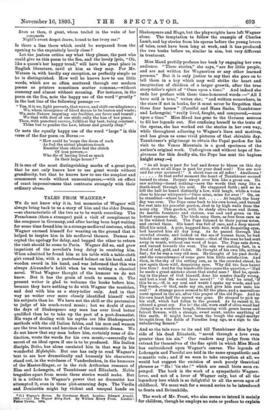BOOKS.
MR. WATSON'S NEW POEMS.*
Mn. WATSON gives us here what is perhaps the finest, perhaps, again, only the all-but finest, poem he has ever written. He asks of the Sea "a subtle and delicate largess," "an ethereal alms, out of the wealth of thy soul," though we have no doubt that those critics to whom he replies in big last poem,—as poets, like other human beings, love to reply to those charges which are really no charges, but ignominious cavils at the choicest qualities which their victim has dis- played,—will tell him that it is in wealth of imagination that he is most deficient, and that he doles out his gifts with a fastidious discrimination that is parsimony in disguise. We do not agree with them. Though there are only seventy-one brief pages in this little book, and though of these seventy- one brief pages we have read and admired thirty at least in other publications before, we do not know when we have found pages that fascinate us so much even at the sixth, or it may be perhaps the tenth, reading. Indeed it seems almost impossible to turn from reading to the too easy task of expressing the enjoyment with which the reading fills the reader. If memory would serve, the present writer would like to know at least sixty-five of these seventy-one pages by heart, though of poems rashly committed to memory in undiscriminating youth, we might say with Wordsworth that- " The wiser mind Mourns less for what age takes away
Than what it leaves behind."
Mr. Watson gives us comparatively little, yet almost all he gives is of the stuff we should desire never to lose our grasp
• The Father of the Forest, and other Poems. By William Watson. Wi'la Pottrsit after a Photograph br Frederick Hellyer. Lot don; John Lane. Cnic3go Stone and Kimball. 1E95.
of. Take the "Apologia" itself with which this little volume closes. Never was there a poem less needed for the purpose for which it appears to have been written, and never was there one more stately. We smile when we find the poet dwelling on the foolish criticisms which found him so happy an oppor- tunity for vindicating what really stands in no more need of vindication than Keats stood of Shelley's " Adonais," or Shakespeare of Milton's exquisite eulogy ; but if poets had written of themselves only that which seemed to be needful for their own vindication, we should have lost some of the most delightful poems in the language. For, naturally enough, what they love to dwell on is that of which they have a right to be proud, and not that of which they are more than half disenchanted and desire only to palliate or excuse. After speaking of the great poets, to whom Mr. Watson claims some kinship of nature, however distant, he continues :--
"And though I be to these but as a knoll
About the feet of the high mountains, scarce Remarked at all save when a valley cloud Holds the high mountains hidden, and the knoll Against the cloud shows briefly eminent ; Yet ev'n as they, I too, with constant heart, And with no light or careless ministry, Have served what seemed the Voice ; and unprofane, Have dedicated to melodious ends All of myself that least ignoble was.
For though of faulty and of erring walk, I have not suffered aught in me of frail To blur my song ; I have not paid the world The evil and the insolent courtesy Of offering it my baseness for a gift. And unto such as think all Art is cold, All music unimpassioned, if it breathe An ardour not of Eros' lips, and glow With fire not caught from Aphrodite's lreast, Be it enough to say, that in Man's life Is rcom for great emotions unbegot Of dalliance and embracement, unbegot Ev'n of the purer nuptials of the soul ; And one not pale of blood, to human touch Not tardily responsive, yet may know A deeper transport and a mightier thrill Than comes of commerce with mortality, When, rapt from all relation with his kind, All temporal and immediate circumstance.
In silence, in the visionary mood That, flashing light on the dark deep, perceives Order beyond this coil and errancy, Isled from the fretful hour he stands alone And hears the eternal movement, and beholds Above him and around and at his feet, In million-billowed consentaneousness, The flowing, flowing, flowing of the world. Such moments, are they not the peaks of life ?
Enough for me, if on these pages fall The shadow of the summits, and an air Not dim from human hearth-fires sometimes blow."
Whether that be more fitly described as the pride of true humility or the humility of true pride, we hardly know. It is perhaps a fine combination of both. It is a pride which bows its head, and a humility which exalts itself in its recog- nition of the great ideal at which it aims. But whatever else it is, it is verse as stately as the present generation has produced.
"The Father of the Forest," with which this tiny volume opens, is a beautiful poem, in which Mr. Watson endeavours to contrast the human measure of time and all its historic pageants of real or imaginary achievement, with that calm scorn for so-called action with which the silent watcher, who notes the exaggerated emphasis of human memory and the tumultuous bubbling of temporary passions by which the ironic crises of human fate are brought about, would regard the insignificant deeds of which the " carven centuries," as Mr. Watson finely terms them, retain the coldly crystallised traces. Take this reminder of the Spanish Armada as the "Father of the Forest" may be supposed to have heard it boasted of in the England of Elizabeth :—
" Already wast thou great and wise,
And solemn with exceeding eld, On that proud morn when England's eyes, Wet with tempestuous joy, beheld Round her rough coasts the thundering main Strewn with the ruined dream of Spain ; "
or this rumour of "the last of our adventurer kings : "— " The roystering prince, that afterward Belied his madcap youth, and proved A greatly simple warrior lord Such as our warrior fathers loved— Lives he not still? for Shakespeare sings
The last of our adventurer kings. His battles o'er, he takes his ease, Glory put by, and sceptred toiL Round him the carven centuries Like forest branches arch and coil.. In that dim fane, he is not sure Who lost or won at Azincour I"
There you have the first hint of the insignificance into which the great conquests of human history may lapse when they are recalled in the retrospect of an unimpassioned memory. Bat men's distorted perspective of many of their own feverish conflicts, and the transience of human conceptions of what is glorious and what is the mere foam and waste of human impatience, are better pictured in the second part of the poem, in which the "Father of the Forest" supplies his own commentary on the frets and spasms of the human drama. Perhaps this conclusion is the finest portion of the whole
Now from these veins the strength of old, The warmth and lust of life depart; Full of mortality behold The cavern that was once my heart I Me, with blind arm, in season due, Let the aerial woodman hew.
For not though mightiest mortals fall, The starry chariot hangs delayed. His axle is uncooled, nor shall The thunder of His wheels be stayed. A changeless pace His coursers keep, And halt not at the wells of sleep.
The South shall bless, the East shall blight,.
The red rose of the Dawn shall blow ; The million-lilied stream of Night,
Wide in ethereal meadows flow; And Autumn mourn ; and everything Dance to the wild pipe of the Spring.
With oceans heedless round her feet,
And the indifferent heavens above, Earth shall the ancient tale repeal Of wars and tears, and death and love; And, wise from all the foolish Past, Shall peradventure hail at last The advent of that morn divine When nations may as forests grow, Wherein the oak hates not the pine,
Nor beeches wish the cedars woe, But all, in their unlikeness blend Confederate to one golden end—
Beauty : the Vision whereunto, In joy, with pantings, from afar, Through sound and odour, form and hue, And mind and clay, and worm and star— Now touching goal, now backward hurled— Toils the indomitable world."
Few of our poets have conceived anything finer than these verses.
"Me, with blind arm, in season due, Let the aerial woodman hew," is one of those "greatly simple" touches of which Mr. Watson gives us so many in this small volume. We should find it difficult to choose between the beauty of the first three poems, but we believe that the "Hymn to the Sea," on which we have commented before in these columns, is the most magnificent, in spite of its "amorist agonist man,"—an expression which mars the simplicity of an otherwise flaw- less as well as magnificent poem, just as an athlete spoils the symmetry of his figure by making a pageant of the swelling muscles of his arm when there is no sufficient excuse for such an exhibition of the redundance of his strength. Never- theless, we do not doubt for a moment that the "Hymn to the Sea" will rank among the great poems of the English language, for it is as original as it is simple. Let us take part of the noble passage which immediately follows his " amorist agonist man,"—that literary tumour (as it seems to us) which Mr. Watson is so careful to display on a shape of otherwise perfect symmetry and health. He is tracing out the many analogies between man and that mighty Sea to which his
poem is addressed :—
" Man that, rejoicing in conflict, like thee when precipitate tempest, Charge after thundering charge, clangs on thy resonant mail, Seemeth so easy to shatter, and proveth so hard to be cloven; Man whom the gods, in his pain, curse with a soul that endures ; Man whose deeds, to the doer, come back as thine own exhala- tions
Into thy bosom return, weepings of mountain and vale ; Man with the cosmic fortunes and starry vicissitudes tangled, Chained to the wheel of the world, blind with the dust of its. speed, Even as thou, 0 giant, whom trailed in the wake of her conquests Night's sweet despot draws, bound to her ivory car."
Is there a line there which could be surpassed from the opening to the exquisitely lovely close ?
Let the jealous critics say what they please, the poet who could give us this poem to the Sea, and the lovely lyric, "Oh, like a queen's her happy tread," will have his great place in English literature, cavil at him as they may. For Mr. Watson is, with hardly any exception, as perfectly simple as he is distinguished. How well he knows how to use little
words, which are so often scattered through our modern poems as printers sometimes scatter commas,—without economy and almost without meaning. For instance, in the
poem on the Sea, note the happy use of the word " greatly " in the last line of the following passage :—
"Yea, it is we, light perverts, that waver, and shift our allegiance ; We, whom insurgence of blood dooms to be barren and waste;
We, unto Nature imputing our frailties, our fever and tumult ; We that with dust of our strife sully the hue of her peace.
Thou, with punctual service, funniest thy task, being constant ; Thine but to ponder the Law, labour and greatly obey."
Or note the equally happy use of the word "large" in this verse of the fine poem on Burns :—
" How could he 'scape the doom of such As feel the airiest phantom-touch
Keenlier than others feel the clutch
Of iron powers,—
Who die of having lived so much In their large hours P"
It is one of the most distinguishing marks of a great poet, that he not only knows how to use great words without grandiosity, bat that he knows how to use the simplest and commonest words without unmeaningness,—with an effect
of exact impressiveness that contrasts strangely with their ordinary abuse.




















































 Previous page
Previous page